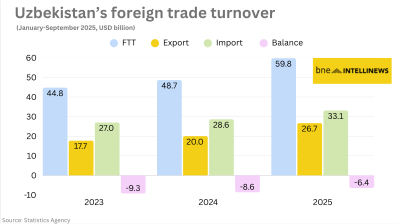While the broad sentiment in Uzbekistan’s stock market can best be described as neutral in terms of the past few months, its moderate weakness was likely due to sellers taking profits after significant runups in the market, though doing so in a light volume environment. That weighed on prices.
Pullbacks, however, are simply part of the ebbs and flows of a secular bull market and provide opportunities for investors to accumulate shares at recently discounted prices. In some recent cases, at more than 20% off their highs of only a few months ago. This correction is an opportunity to acquire shares at good prices, in anticipation of the next leg higher, while earnings multiples compress, making them cheaper yet.
To provide some figures on just how far some blue-chip equities have rallied since the inception of the AFC Uzbekistan Fund on 29th March 2019, the share price of the Uzbek Commodity Exchange (TSE: URTS) is up 1,340%, Biokimyo (TSE: BIOK) +400%, Uzmetkombinat (TSE: UZMK) +416%, Qizilqum Cement (TSE: QZSM) +178%, Quvasoy Cement (TSE: KSCM) +154%, and Toshkent Vino (OTC listed) +137%, excluding dividends, which in several cases yielded an additional 15% to 20% return.
Beyond muted activity in the stock market, under the “hood”, the engine of reform is purring strongly via the presidential decree to develop Uzbekistan’s capital markets, with 2022 set to be an exciting year with many progressive developments.
January certainly didn’t disappoint as the year started off with a “bang!” in the form of a presidential resolution announced on 17th January outlining significant positives on both privatisations and tax news related to the capital markets. Some of the more prominent highlights of the resolution include:
- From 1st April until 31st December 2024, there will be zero dividend tax on shares held in personal accounts (local and foreign individuals), while dividend tax for accounts held by non-resident legal entities will drop from 10% to 5%, in line with the dividend tax on local legal entities.
- Interest income on corporate bonds will be tax-free for both local and non-resident persons and legal entities.
- From 1st July, a stamp duty of 0.3% will apply to all transactions on the Elsis Savdo OTC platform, aligning its fee structure with that of the Tashkent Stock Exchange (previously, the Elsis Savdo platform charged a 20% duty on gross proceeds of a sale regardless of whether a profit or loss was made). Additionally, when a stock is demoted to the OTC market, minority shareholders will be able to request a mandatory buyback of their shares at the market price.
- Foreign stock brokers will now be able to operate as underwriters in Uzbekistan, together with locally licensed brokers with at least UZS 500mn in equity (equivalent to around $46,200).
- Local Uzbek entities will have to IPO locally before they can list abroad, or do both simultaneously.
These developments are long overdue and frankly we would be sceptical of them ever happening if it was not for the outstanding team including Deputy Prime Minister and Minister of Economic Development and Poverty Reduction Jamshid Kuchkarov, Minister of Finance Timur Ishmetov, Deputy Minister of Finance Odilbek Isakov and Director of the Capital Market Development Department Sarvar Akhmedov, all of whom clearly understand what needs to be executed on to bring Uzbekistan’s capital markets into the 21st Century so-to-speak.
In addition to the aforementioned items, UzAvto Motors (the largest automobile producer in Uzbekistan), UzAvto Motors Powertrain, O'zbekgeofizika (the state-owned geological company), O'ztemiryulkonteiner (a state-owned dry port and container terminal operator) and Dori-Darmon (the largest pharmacy chain in Uzbekistan) have all been approved for IPO.
A further four companies were approved for secondary market offerings including Uzbekistan Post, (the national post office), Universal Sugurta (an insurance company), and Alskom (the third-largest private insurer in Uzbekistan).
Unrelated to the presidential decree, but nonetheless very positive news, on 1st January, Navoi Mining and Metallurgical Kombinat (NMMC) was officially split into three companies, following the presidential decree from 6th March 2020.
NMMC has been split into a uranium business that will remain state-owned, a gold business that is slated for IPO locally and will be followed by an eventual dual listing, and a third arm to manage “social infrastructure”. NMMC also reported operating results for FY 2021 with profits of UZS 11.3trn ($1.045bn), an increase of 12.7% over 2020. Meanwhile, Almalyk Mining and Metallurgical Kombinat (Uzbekistan’s largest copper mine scheduled for IPO this year) reported profits of UZS 5.32trn ($492mn), marking an increase of 36% over 2020.
The author is the CIO of the AFC Uzbekistan Fund.
Disclosure: The AFC Uzbekistan Fund holds positions in URTS, BIOK, UZMK, QZSM, KSCM and Toshkent Vino.
Opinion

Don’t be fooled, Northern Cyprus’ new president is no opponent of Erdogan, says academic
Turkey’s powers-that-be said to have anticipated that Tufan Erhurman will pose no major threat.

COMMENT: Hungary’s investment slump shows signs of bottoming, but EU tensions still cast a long shadow
Hungary’s economy has fallen behind its Central European peers in recent years, and the root of this underperformance lies in a sharp and protracted collapse in investment. But a possible change of government next year could change things.

IMF: Global economic outlook shows modest change amid policy shifts and complex forces
Dialing down uncertainty, reducing vulnerabilities, and investing in innovation can help deliver durable economic gains.

COMMENT: China’s new export controls are narrower than first appears
A closer inspection suggests that the scope of China’s new controls on rare earths is narrower than many had initially feared. But they still give officials plenty of leverage over global supply chains, according to Capital Economics.




